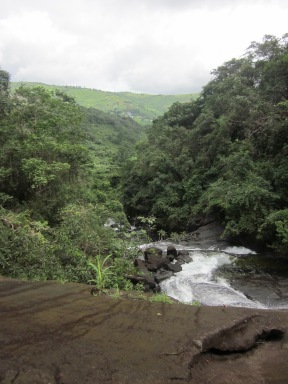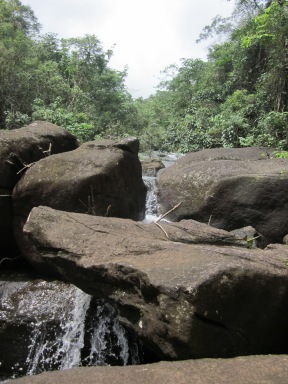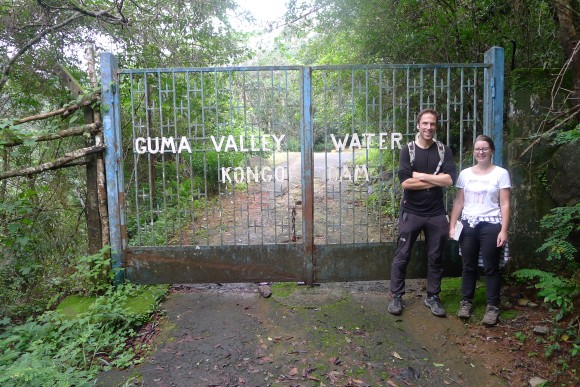Thursday, September 22, 2016
SEIRRA LEONE BUNDO SOCIETY:"MUTILATION OR JUST CIRCUMCISION??
Friday, September 16, 2016
A long weekend in Freetown: A Tourist's story worth telling✍🏿
Freetown might seem an odd destination for a long weekend but it’s certainly doable, as our friend just proved.
I picked up our old housemate Tim – or Topsy Tim, as the Flump named him (her first CBeebies in-joke) – from the SeaCoach terminal at 6am on Friday.
He’d enjoyed a trouble-free overnight flight until the passport officer stamped him in and then asked for money for a drink. Being a kindly soul, and having nothing smaller, Topsy handed over a fiver (Sterling), enough to fund a decent night out.
We aimed to show Tim as much of what Sierra Leone had to offer as is possible inside four days.
So after a quick breakfast at our place, we took to the mountain road to give him a taste of life here from the comfort of the passenger seat.
The route climbs away from the city through early Krio villages, skirts the rainforest – edges eaten away by deforestation – before meeting the stunning coastline.

All the gates, pillars and slabs you could wish for [Photo: T.Bowen]
As usual, I got stuck behind a stationary poda-poda while negotiating the chaotic street market and then enraged the massed shoppers, vendors, motorists and police alike with my clumsy overtaking.
The road follows part of the old railway, on which trains once chugged at 15mph along 365km of narrow gauge track spanning the breadth of the country. These days, the station platform signs greet the arrival of road traffic to Hastings and Waterloo.

My favourite sight on this journey is a petrol station faithfully painted in the livery of British supermarket Asda. (Note National Lottery and Wall’s ice cream boards) [Photo: T.Bowen]
As we bobbed aimlessly, some distance from land, it struck me that this was Topsy’s “Welcome to Africa” moment. He’d had it too easy until then.
There were a few other boats within frantic waving distance but we didn’t need rescuing. The skipper diagnosed an oil shortage and simply adopted a gently-does-it approach to the rest of the journey, depositing us on the little beach in front of Dalton’s Banana Guesthouse.
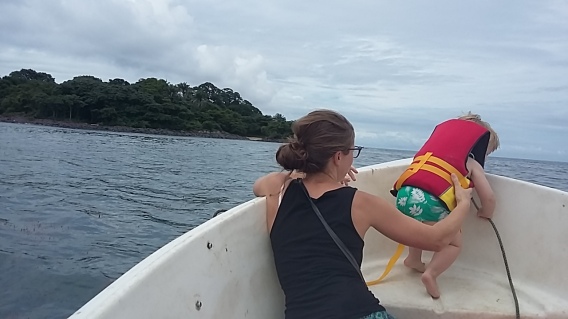
“Engine trouble? I’m off.”
The three Banana Islands – named after their shape – make up an archipelago at the foot of the Western Peninsular. Fittingly for Tim, we were staying on the largest, Dublin (pron: Doo-blin), the namesake of his home county.
The island, a longstanding expat getaway, showed signs of decay. Gregory, the Greek owner of Daltons said Ebola had wiped out his staple market of young NGO workers seeking a budget base for beery weekends snorkelling or diving.
During the outbreak, demand changed. Emergency workers wanted luxury lodges and cocktails to de-stress. Now things are returning to normal, he says. However, a neighbouring high-end “glamping” establishment has gone bust, and the once highly-rated community-run bungalows lie empty and overgrown.
No doubt Greg’s friendly but frank attitude – that if you want luxury you should pay more elsewhere – creates a hostel-type atmosphere that I really enjoyed. “Don’t thank me now,” he’d say, “you don’t know what’s going to go wrong tomorrow.”
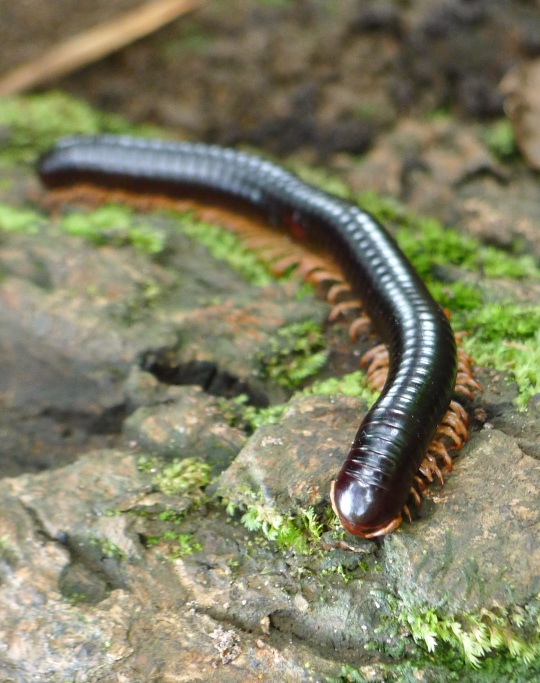
Not much of a looker but this room-mate snored less than the missus
The bungalows housed comfortable mattresses on concrete slabs, although ongoing renovations meant dingy lighting and sharing a shower with huge and shadowy creepy-crawlies. The food – served together with other guests – was delicious: fresh yellowfin in garlic sauce with pasta, or blue-boned grouper grilled with bread.
The locals seemed chilled out; not so desperate to sell you stuff as on the mainland. This laid-back vibe was doubtless helped by the quantity of pungent marijuana being smoked on its shores.
Dublin offers a small glimpse of Sierra Leone’s history. A few wrought iron lamp-posts, left by 17th century Portuguese settlers, remain standing, while rusting cannons and a grand but overgrown graveyard are remnants of the Royal Navy’s anti-slavery mission a couple of centuries later.
In between, the island was used as a sort of holding camp for slaves captured on the mainland before they were shipped across the Atlantic. We’re told these country folk would have been so terrified of the sea that they’d board slave ships without a fight just to keep their feet dry.
An overgrown jungle path leads to the next island, Ricketts. But we were carrying a toddler where a machete was needed, so turned back to a lovely little beach known as Big Sands.
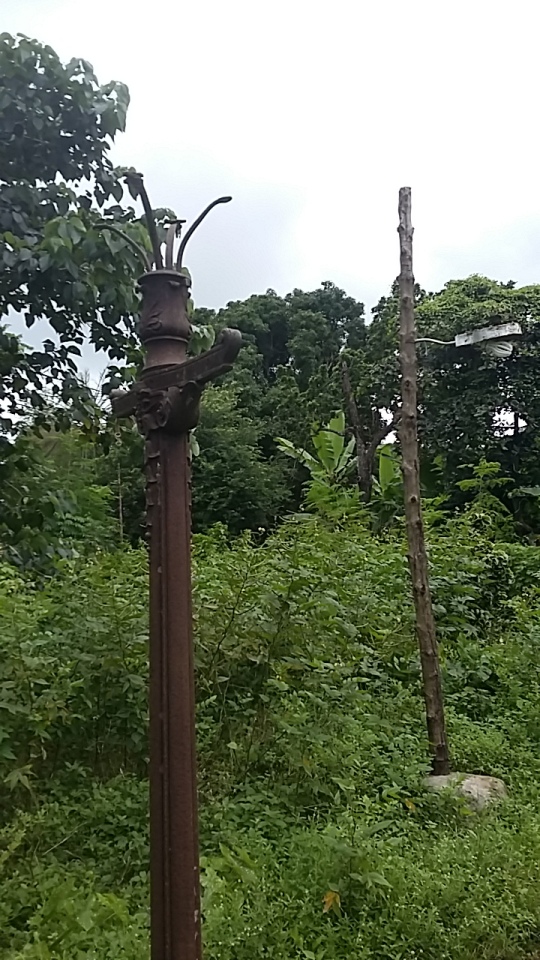
17th Century lamp-post, foreground, with 21st Century equivalent at rear
This would have been the perfect castaway beach, had the weather not churned up such a lot of seaweed. Oh, and had it not featured a naked man talking on his phone.
Still, the water was perfect for swimming and – for once – the Flump’s enthusiasm for the sea was matched by our own.
After a little more than 24 hours of playful relaxation, with no shortage of boozing, we headed back to the mainland. We’d timed our beach visit well, as the weather turned on the way home.
Topsy and I sought sanctuary in one of our local bars, where things were warming up nicely as we arrived, including – sadly – our bottles of Guinness Foreign Extra.
To the uninitiated, this African-brewed version – popular, I supsect, due to previous dubious claims about “strength” tapping into the African psyche – weighs in at 7.5%. Tim declared Salone’s version to taste “nothing like” its more famous Nigerian cousin. To me it was like a bizarre treacle-vodka cocktail, though I didn’t let that deter me.
I was delighted when Thomas – our neighbour who I run with – joined us, meaning Tim got to enjoy some genuine no-strings craic with the locals. We also roped in Thomas to join Topsy’s 20-mile run the next morning.

You can take the white boy out of Doo-blin…
His New York Marathon training plan* meant this was an immovable fixture on our itinerary. Rising at 6am after another boozy night proved a challenge but fortunately heavy rain woke me, meaning Tim and I hit the streets by half-past.
I’d mapped out a picturesque 10-mile route, intending to accompany Tim for one lap before leaving him to complete a solo second. Unfortunately, the stunning vistas were obscured by the weather and – in any case – we looked out for little other than our footing.
After five miles, Thomas joined us. I was grateful as, once we hit the wind-whipped beachfront, I was dropping off the pace. After seven miles, I lost sight of them.
After plodding wearily home, I showered and dashed back out to try to get a souvenir photo of Tim training in Africa.
By that stage, even poor Thomas was suffering. Topsy, meanwhile, ignored the rising temperatures to up the pace.
Running is a great way to take in a new place and he got to see one of the mass jogging groups, half shuffling-half dancing behind a van as it blared music, as well as the numerous impromptu beach football matches.
Salonean cuisine is a perfect recovery meal, so we headed out to try fish cooked in the traditional cassava leaf, groundnut and onion sauces before our next stop: Tacugama Chimpanzee Sanctuary.
Just a few miles out of the capital, this rainforest retreat felt a world away from its bustle as we arrived for the 4pm tour. Of 21-55,000 of the western subspecies of these endangered apes in existence, some 5,500 are thought to live in Sierra Leone. More than half are outside protected areas, at the mercy of bushmeat hunters.

“I’m not sure about that banana gag.” [Photo T.Bowen]
Though a little light on information, the tour showed off an impressive set-up and proved particularly memorable for everyone politely pretending not to notice one adult male’s state of high excitement at the commencement of feeding time.
This impromptu revelation of a surprisingly small banana by such a large mammal made us men walk a little taller.
Our beds for the night were in an “eco-lodge” high in the forest canopy. From its balcony, we stretched our legs, listened to the calls of myriad birds and watched a monkey scramble across the treetops.
On the way to dinner, an owl swooped over Tim’s head and we watched it perch for nearby. Whether it was an African wood owl or one of its rufous fishing relatives remains a matter for debate.
A morning tramp proved more successful in terms of identification, as we spotted an impressive red-bellied paradise flycatcher and a striking western black-headed oriole after drinking in the views from the falls below nearby Kongo Dam.
The walk left us filthy and sweaty on departure and we felt a bit rough dining at possibly Freetown’s classiest venue, the Country Lodge, which offers spectacular views over the city’s Western edges.
The hotel is surrounded by Krio wood shingle homes – built on steel stilts to keep them cooler – which housed the European administrators of the early colony of freed slaves.
Later, we saw less grand – but just as characterful – examples of this architecture as we took a walk downtown, where the colourful buildings appeared to lean on more modern neighbours for support.
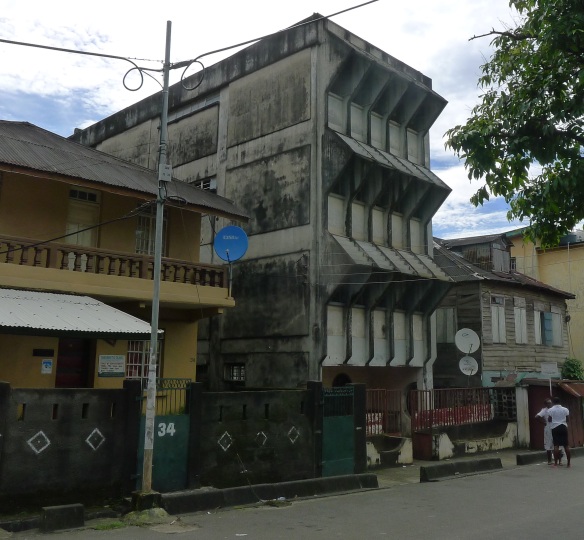
Modern, brutalist or traditional Afro-Jamaican? Take your pick. [Photo: T.Bowen]
The One With The Common Sense and I had yet to explore the area around the State House and the impressive Cotton Tree, under which much of Sierra Leone’s history has unfolded.
The usual weekday bustle can make this feel an intimidating place but we were pleasantly surprised at how relaxing we found our stroll on what was a bank holiday Monday, with the Flump gaining her usual army of admirers.
Unlike our West End neighbourhood, in this poorer district, there are no iron gates sealing people into compounds. Here, scenes of people gathering to eat, drink and chat amid the decaying grandeur are reminiscent of central Havana.
We decided to mark Tim’s last hours here with a final stroll along Lumley Beach, where limited parking provoked a marital dispute between weary driver and as-yet-unlicensed wife conducting proceedings from the back seat. Thankfully, old housemate Tim had enough experience of our volatility to let it wash over him until we parked up for a better-tempered stroll.
More by luck than planning, his visit coincided with Eid celebrations so the beachfront atmosphere was even headier than usual.
The promenade was packed with revellers, many enjoying drinks from carboot coolboxes, while we even spotted a “street food” van of the sort you’d find in London’s trendier nightspots.
Plenty of kids were still up, meaning a double-shift for the man who walks around all day selling squeaky inflatables, so it felt like an occasion for everyone to enjoy.
After a quick beer, it was home for Tim to enjoy one last quintessential West African experience: jollof rice. This sweet, stodgy and lightly spiced rice dish is the source of much friendly banter across the region about who makes the original/best. Sadly, I’d wager the one we had wouldn’t win that argument.
At midnight – just 90 hours after picking him up – I deposited Topsy with a manhug or two back at the SeaCoach station.
It had been a whistlestop tour and I was pretty shattered. So, when overtaking a taxi, I noticed too late that it had stopped at a police checkpoint, rather than to collect passengers.
Cue noisy accusations of “driving badly” and my now stock response of going on the offensive while keeping my banknotes buried in my pockets. I feared this time I might not get away with it.
However, after some discussion about exactly what offence I was alleged to have committed, a senior officer told me it was a holiday, a happy day, and that I should head home.
I did, relieved to let my head hit the pillow.
It had indeed been a long weekend – but a great one with it.
* I should explain that it was me who introduced Topsy to running with the gentle assurance that he “wouldn’t finish last” at parkrun. Not only did the swine beat me but he’s since gone on to numerous podium positions and a sub-2:40 marathon. The fecker.
https://expatfamilyfortunes.com/2016/09/15/a-long-weekend-in-freetown/#more-3049











